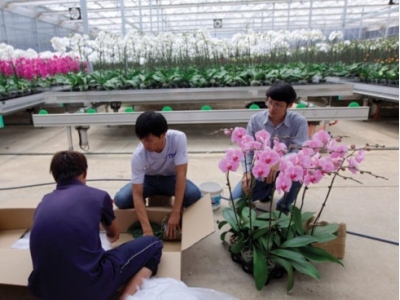Tentative banks slow hi-tech agricultural credit package

There is a VND130-140 trillion ($5.72-$6.16 billion) credit package for hi-tech agricultural projects, however, few firms have been able to access it due to cautious banks.
The guidance on the VND100 trillion ($4.4 billion) credit package for hi-tech agricultural projects was issued by the Ministry of Agriculture and Rural Development (MARD) and the State Bank of Vietnam (SBV). With the participation of nearly a dozen banks, the credit package’s value has increased to VND130-140 trillion ($5.72-$6.16 billion).
However, according to a source of VIR, only a handful of firms can get disbursement from this credit package. Agribank is the leading lending, having provided loans for 18 firms and hi-tech agricultural projects. Many firms said that the banks’ lending procedures are strict, although MARD’s criteria are quite simple.
Responding to firms’ complaints, many banks said that they wish to provide capital for hi-tech agricultural projects, but only a few applicants meet their criteria.
Talking with VIR’s reporters, Nguyen Thi Phuong, deputy general director of Agribank, said that, “When agreeing to finance a firm’s project, banks become project investors. Thus, banks have a vested interest in ensuring that the firms themselves are efficient and the projects feasible and capable of recovering the investment capital in the future.”
Similarly, Nguyen Duc Huong, senior advisor of LienVietPostBank, said that banks have surplus capital and are looking for good projects. If firms have feasible projects with a high likelihood capacity of recovering capital, then garnering investment capital is a simple problem.
Feasibility is key
What firms usually complain about the most when submitting application for loans is the collateral for their projects, because agricultural lands have low value, while the assets on these lands and factories are not considered collateral. Nevertheless, many banks insist that if the projects are feasible enough, they do not ask for collateral.
“We do not require collateral, we just look at the projects’ feasibility and risks involved during all stages of investment, manufacturing, consumption, and the capacity to recover capital,” Phuong said.
Previously, many hi-tech agriculture projects, such as the hi-tech egg processing plant of DTK Phu Tho Co., Ltd, and Ba Huan Co., Ltd, have borrowed hundreds of billion VND from banks without collateral.
To approach these loans, firms have to be transparent and publicise all relevant information, as well as invite banks to participate in the project from the beginning, from the stage of planning, to supervising the projects’ construction, cash flows management, and selling the products.
Nguyen Duy Hung, chairman of The PAN Group, said that if a project has capital but fails to determine the products and market, the possibility of failure is high.
“The foundation for an investment decision in hi-tech agricultural projects is market demand, and only high-value agricultural products can apply hi-technology to the production, as the production cost for these products is much higher than usual,” Hung said.
It is rumoured that many firms are racing to implement hi-tech agriculture projects with the aim of borrowing from the credit package, although the feasibility of recovering capital is not verified.
The market for agricultural products is not stable, while hi-tech agricultural products usually have high selling price, thus, it is more difficult for firms to sell their products.
Therefore, if banks decide to lend too easily, it may lead to huge consequences for firms and banks.
Related news
Tools

Phối trộn thức ăn chăn nuôi

Pha dung dịch thủy canh

Định mức cho tôm ăn

Phối trộn phân bón NPK

Xác định tỷ lệ tôm sống

Chuyển đổi đơn vị phân bón

Xác định công suất sục khí

Chuyển đổi đơn vị tôm

Tính diện tích nhà kính

Tính thể tích ao



 Vietnam, Bangladesh extend rice trade deal
Vietnam, Bangladesh extend rice trade deal  Vietnam looks to put rice on Europe’s plate
Vietnam looks to put rice on Europe’s plate